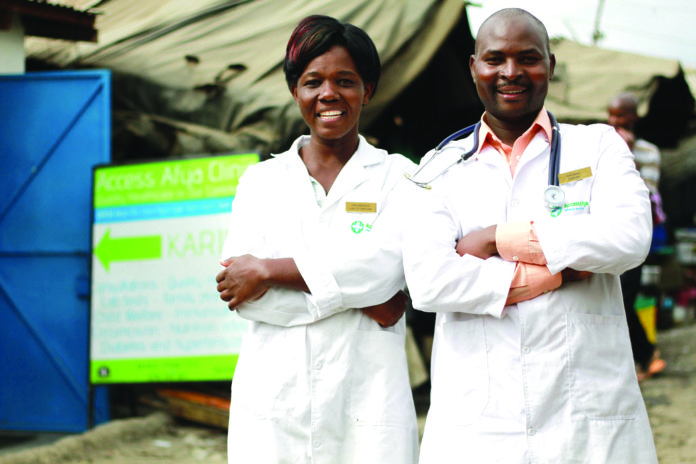The sustainable, affordable and cost-effective healthcare model
By Caroline Mwendwa
There is a disparity in accessibility and affordability of healthcare for different socio-economic groups in Kenya. Access Afya, a social enterprise founded by Melissa Menke in 2012, fills this gap through the creation of access to quality health through sustainable care model. “Access Afya ensures that patient centred outcomes oriented, digitally driven primary healthcare is accessible to even the most underserved populations,” says Dr Daphne Ngunjiri, Access Afya’s Managing Director.
The model
Access Afya runs a chain of micro-clinics in Nairobi’s informal settlements and programs such as Healthy Schools to deliver check-ups, treatments and health education to children in partner schools.
The clinics provide consultations, lab tests, chronic condition management, immunizations, family planning, antenatal and post-natal care and urgent care to the community.
Field Care Programs take the clinic to the people, working with factories, schools, or other community institutions. “We send a mobile team with health equipment in a backpack to deliver care at different sites so people don’t always need to come to the clinic to access healthcare,” says Jaclyn Boland, Field Care Manager.
Education on health issues and concerns improves the communities’ access to health care services. Access Afya delivers this through community engagement to ensure patients have the information they need to make informed health decisions. Educating patients on their rights to care is a significant step towards a connected, informed and healthy society.
Access Afya is keen on thequality of care and products given to the patients that visit or seek their services. “Access Afya is committed to stocking only quality products at all our facilities. Towards this, we work mainly with one supplier who guarantees quality by conducting multiple tests on all products,” says Arpana Philip, Health Operations Manager.
Quality of care is also reflected in the staff at the clinics. Access Afya clinics have a licensed, trained and certified medical professionals who focus on building relationships with patients and the community in general.
Data driven approach
Access Afya is far ahead of others in terms of technology and this is key to their business model. All health and operational data goes to the informatics department, who analyses and disseminates the information. The supply chain department for instance, to understand consumption, stock movement and trends while clinical data informs protocol adherence and disease prevalence in the community.
The informatics arm of this organization is also crucial in the monitoring and evaluation of their projects. “Working in schools has helped a great deal in predicting the kind of health problems children have so we can develop and tailor the right solutions, treatment and education needed,” says Osob Osman, Monitoring and Evaluation Fellow.
The innovation lab
Access Afya’s innovation lab integrates emerging innovations into their health services with the goal of improving health, social and economic impact within their communities. These innovations could be applied through technology, partnerships, finance, new business models and improvements on current product services and delivery.
One example of innovation Labs is Access Afya’s chronic care management program, AkibaYaRoho. This program combines financial innovation through a digital health and savings wallet service delivery model, innovation through community-clinic linkages and collaboration with other health players – BoehringerIngelheim and Ashoka’s ‘Making More Health’ initiative.
Why Access Afya stands out
Access Afya stands out because they care about their patients and take the extra step to follow up with them to find out if they have recovered or accessed advanced specialist care within the health care system such as x-rays. This outcome driven approach helps patients achieve their health goals, while Access Afya learns from their data to improve the product and service delivery so patients can continually access care they want, need and afford.
Access Afya’s model has significant impact not just for the health of patients, but even greater economic impact as a cost-effective model for universal health care delivery that can be replicated and scaled globally.
Future plans
Access Afya continues to develop and improve its current operational model. It is currently operating within three communities in Nairobi: Mukuru Kayaba, Mukuru LungaLunga, and Kiambu. By the end of the year, they will be in three new communities and plan to grow faster in 2018 going forward.


















